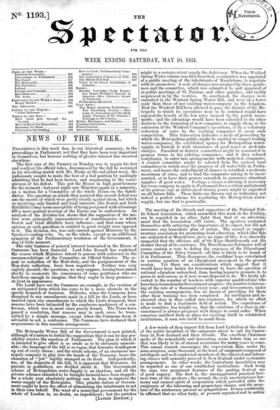NEWS OF THE WEEK.
PRECEDENCE is this week due, in our historical summary, to the proceedings in Parliament, not that they have been very important in: themselves,. but because nothing of greater interest has occurred elsewhere. . .
-The'first care of the Premier on Monday was to regain his feet and readjust- s official robes, discomposed by the fall he sustained in his wrestling-mateh with Mr. Hume at the end of lust week. He judiciously sought to make the best of a bad position by smilingly admitting-that he had been beaten, and acquiescing in the conse- quences of_ his defeat. This put the House in high good-humour for the,monient : but next night saw, Ministers again in a minority, On a motion for .a Committee of te whole House on•the Spirit- duties. The question onwhich.they received this second defeat was one the merits of.which were pretty clearly against them, but which as involving only.-limited and local interests (the Scotch and Irish diStilreilds) May seeni Susceptible of ha* postpoAed with advantage till a more general, revision of the Excise can be undertaken. An analysis of the division-list shows that the supporters of the mo- tion were principally representatives of constituencies in which Scotch and Irish -distillers have influence ; and that some whose opinion on such questions is entitled to great weight were.8pposed to it. The division, ioo, was only carried against Ministers by the SpeakeFiediting-Vote. So, on the whole,' except as an additional sy_mptosa. of :the Parliamentary weakness of the Government, it
was of little Moment.' .
:= The only business of general interest transacted.in the House of eemmons has been financial. Lord John Russell has explained the course which Ministers intend to pursue with reference to the recommendations of the Committee on Official Salaries. The re- peal :or reduction of thelfalt-duty, and the postponement of the Hop-duty 'collection, haVe been negatived. Neither was very eagerly pres'sell; the questions, we may suppose, having been raised chiefly to exonerate the consciences of some gentlemen who are fastidious enough to iinagine that they ought to keep promises— it least-in appearance. The Lords have set the Commons an example, in the excision of an antiquated forr,n which has come to be a mere obstacle to the speedy despatch of business. Hitherto, when the Commons have disagreed to any amendments made in a bill by the Lords, or have insisted, upon any amendments to which the Lords disagreed, their reasons have been intimated by the cuinbrOus machinery of a con- ference, which was in most cases purely .formal. The Peers have passed a resolation, that reasons may in such cases be trans mittedhy a Simple •message, except when the Commons deem it advisable to ask a conference. The Commons have declared their acquiescence in this sensible arrangement.


























